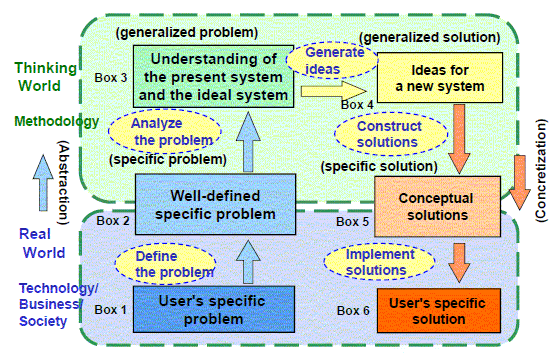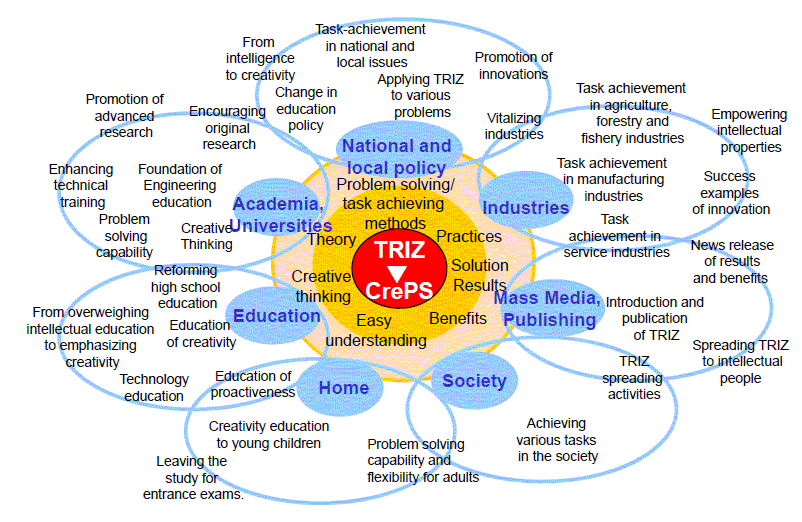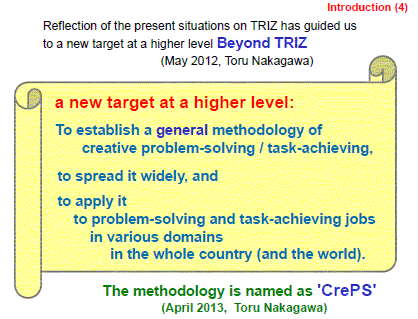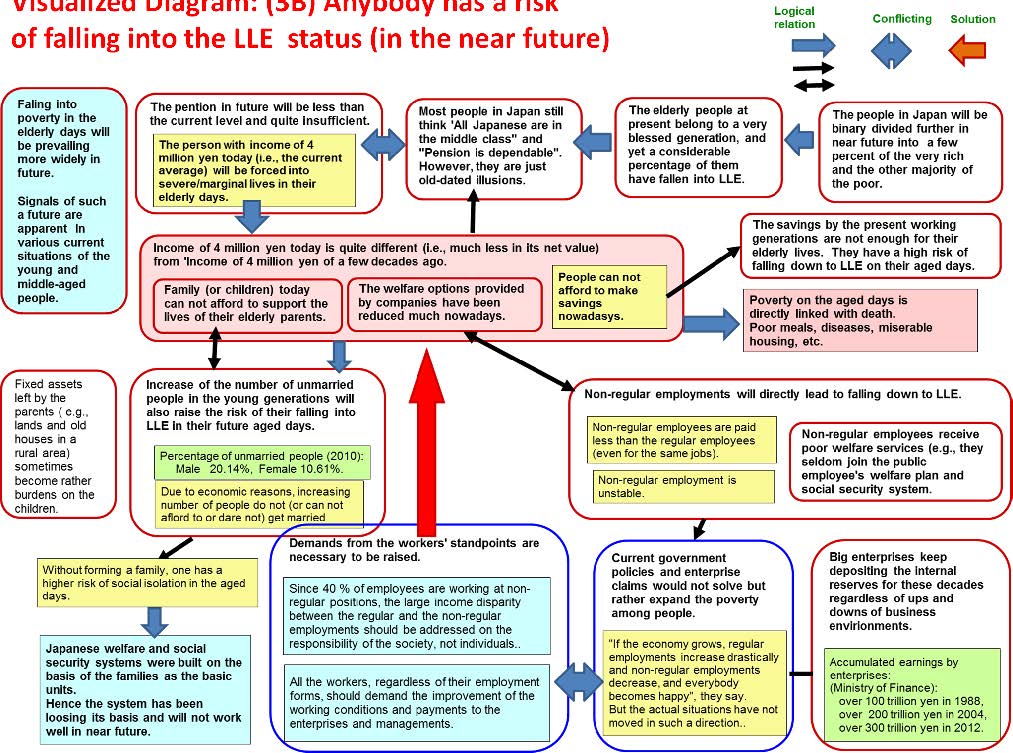On the timing just before the election of the House of Councilors, I made a summary of my recent research. A set of documents of the summary are posted here (on Jun. 28), and were already sent via post to about 250 people, whom I got acquainted with mostly before I encountered TRIZ. My recent work may be summarized as the following 3 categories.
(1) I have clarified the structure of ‘General Methodology of Creative Problem Solving (CrePS)’.
Ref. [1] The top page of my Web site: "TRIZ Home Page in Japan" 
Ref. [2] (Abstract of) TRIZCON2016 Presentation (Mar. 3-4, 2016)  (See below
(See below  )
)
(2) For the purpose of applying the CrePS methodology to social problems, I visualized the logic of Fujita’s Book “The Low-living Elderly (LLE)” in diagrams.
Ref. [3] A pamphlet of 24 pages of visualized LLE diagrams. 


Ref. [4] Diagram: “Anybody has a risk of falling into the LLE status (in the near future)”.  (See below
(See below  )
)
(3) I critically reviewed the 82 customer reviews of the LLE book posted at the Amazon.co.jp site. Quite a number of customers have sympathies with the comment saying ‘The people who have fallen into the LLE situations are to be blamed for themselves, not the society”. I see a serious lack of understanding of social thoughts and social ethics.
Considering the roots of such lack of understanding, I have recognized that ‘Liberty vs. Love’ is ‘the Principal Contradiction in the Human Culture’. Human Culture has been trying to solve the Principal Contradiction, but the contradiction has become even more complex and difficult to solve in many aspects. As we learned in TRIZ, recognizing/understanding the contradiction first and working to solve the contradiction should be our basic/fundamental approach to social problems.
Ref [5] ‘Liberty vs. Love’: The Principal Contradiction Inherent in the Human Culture. 

 (See below
(See below  )
)
Editor's Post Note (Toru Nakagawa, Jun. 28, 2016 (before the election) (See below  )
)
Eidtor's Post Note 2 (Toru Nakagawa, Jul. 29, 2016 (after the election) (See below  )
)
 Ref. [5] 'Liberty vs. Love’ is ‘the Principal Contradiction in the Human Culture’. (Ref.
Ref. [5] 'Liberty vs. Love’ is ‘the Principal Contradiction in the Human Culture’. (Ref. 
 )
)
Liberty vs. Love:
The Principal Contradiction Inherent in the Human Culture:
- Deep Bases of Thoughts Underlying the Arguments by People
on the "Low-living Elderly" Book. -
Toru Nakagawa (Osaka Gakuin University, Professor Emeritus)
TRIZ Home Page in Japan, Apr. 22, 2016 (in Japanese), Apr. 29, 2016 (in English)
0. Introduction
The present paper stems from my work to visualize the logic of Takanori Fujita's "The Low-living
Elderly" Book (2015). I read the 82 customer reviews posted in the Amazon.co.jp site concerning to the book, and I examined them closely. Interestingly, while many readers evaluate the book highly with 5 or 4 stars, many other readers evaluate it very poorly with 1 or 2 stars.
The author [T. Fujita] writes in the book:
"Over 20 % (about 6-7 millions) of the elderly people in Japan are now living poorly at or below the welfare
level, and in future even much larger percentage of the elderly people will be in such poor
situations. Poverty is caused, in spite of individuals' hard efforts, by the society systems. The Constitution
declares to ensure 'healthy and cultural lives of people at the minimal level', and hence we should certainly
support the low-living people (either elderly or not) with some welfare systems."
Many people [who evaluate the book poorly] criticize the book saying:
"The people who became poor because of their selfish and idle lives are not blamed for their deed, but the
society is blamed instead. The book recommends people to scrounge off the social welfare, and then our
country will fail financially. Welfare must take into account of people not only with good will but also with
ill will, otherwise it cannot convince the people commonly. The solutions suggested by the author deny the
market economy and democracy, hence they are unrealistic. Etc."
I visualized the logic of the book and wrote my own opinion reviewing the different arguments contributed
by many readers. During the process, I recognized a very basic issue, underlying deeply in the people's
arguments, related to social philosophy and social ethics. The issue has not been revealed well in the
culture of society and hence it does not have consensus in the society and in the world.
The issue is related to ‘mutual aid in the competitive world', or 'welfare in the world of win-or-lose with
individual responsibility'. Investigating its essence, I have reached the two concepts, Liberty and
Love, which form the two important targets of the human culture.
The present paper clarifies that the Contradiction between Liberty and Love is the Principal Contradiction of the Human Culture. The contradiction between Liberty and Love actually contains the
contradictions between Liberty and Liberty and between Love and Love. The human social structures are built in
complex, hierarchical ways, including the level of individuals, the level of groups and organizations, the level of
industrial enterprises, the level of countries, etc. Contradiction between Liberty and Love becomes more and
more difficult issue at the higher level.
The human culture has been making much efforts for trying to reveal and solve the Contradictions between
Liberty and Love, and it has revealed them to some extent but has not been successful in solving them.
********** The contents of the body are shown below only in their section headers: ***********
1. Liberty and Love: Compatible Contradiction
2. Basic Concepts for Making Liberty and Love Compatible: Ethics and Fundamental Human Rights
3. Principal Contradiction of Human Culture and its Structure
4. Competition and Win-or-Lose
5. Solutions based on Good Human Nature and Solutions based on Bad Human Nature
**********************************************************************************
6. Concluding Remarks
Though I am planning to write some more extensions, I would like to close this working paper here for
summarizing the important propositions so far described.
(1) The Human Culture takes Liberty as its First Principle and pursues for extending it. Liberty is
for every person to decide, to act, and to live for oneself. Liberty aims at Winning various, natural or social,
Competitions. Liberty of a person necessarily collides (Contradicts) with Liberty of another person.
(2) The Human Culture takes Love as its Second Principle and pursues for spreading it
widely. Love is for every person to help and protect one's children and one's family. Love aims at
Self-controlling one's Liberty and at eliminating collisions among Liberty in one's Family. Love, for helping and
protecting the Family (or Insiders), tries to counter the (attacking) actions from Outsiders. Considering the
Family (or Insiders) as a social Activity Unit, Love generates Liberty and Competition at a higher social level.
(3) The Human Culture has been extending the two Principal Principles, i.e., Liberty and Love, and has been
seeking for how to use these two often-contradicting Principles in compatible and appropriate ways. Liberty vs.
Love is named the Principal Contradiction of Human Culture, in the present paper.
(4) As the guidelines for containing and motivating both Liberty and Love and coordinating them, the Human
Culture has been acquiring Ethics, i.e., Moral, Conscience, in plain words. The core part of Ethics is supposedly
installed already in our DNA; and for the same reason it is too obvious and difficult to write it down clearly. The
concept of Fundamental Human Rights is a part of Ethics stated clearly.
(5) Throughout the history of Human Culture, Humans have been trying to extend the two Principal
Principles, Liberty and Love, and to resolve the Principal Contradictions between them, i.e., Liberty vs.
Love. Human Culture has developed to build various Social Systems. The issue of Resolving the Principal
Contradiction, however, has become more and more complex and difficult.
(6) The first reason for causing such difficulties is that the Social Systems have been built so many, so
multi-layered, so large in scale, and so complexly connected, and hence the reality and ideals (or Guidelines) of
Liberty, Love, and Ethics for various Social Systems have not been made clear yet and understood
commonly in the world. The second reason for difficulties is the actual situations where even though the
Guidelines of Liberty, Love, and (social) Ethics were made clear, many individuals and social organizations insist
on their own interests (i.e., Liberty) and take actions not in accordance with Ethics, and actually
become Social Winners. And such actions and organizations, from very small to very large in the scale, exist
everywhere in the World and have their own histories accumulated in many layers.
(7) As is summarized above, the present paper have found the concepts of Principal Principles and
Principal Contradiction lying deep at the root of Human Culture and described the framework structure
of them.
Further, in the near future, the present author wishes to investigate the real situations and conceptual
directions of Liberty, Love, and Ethics for Social Systems in different levels.
Such investigation will certainly build sound bases for revealing the problems of Poverty in the society and
guidelines for improving Welfare and for further changing the Society, which are the issues addressed at since the
beginning of this research.
Editor’s Post Note (Jun. 28, 2016): I think that the current Abe Shinzo’s government is enlarging the disparity and making the poverty problems severer. I think that we should vote the coming election for preventing Abe and his follower parties from getting the two thirds seats at the Upper House. Keeping the Peace Principle in our Constitution is most important for Japan (as well as for the World) in future.
Editor’s Post Note 2. (Jul. 31, 2016): As the results of the Jul. 11 election, Abe and his follower parties, either promoting or tolerating the change of the Constitution, obtained just two thirds seats at the Upper House. This is an alarming situation.
Concerning to the future directions of Japan, the whole range of problems should be considered carefully along the basic process of creative problem solving, and some consistent solution proposals should be constructed and shown clearly to all the people in Japan. Such process of work should be done by the government and by various parties and groups including the opposing/reforming people. For handling wide-ranged and voluminous information and showing the logic of the proposals/solutions clearly in the form easy to understand and useful for discussions, the visualization of the logic is an useful method, I believe.
---
At the present critical stage, I believe that we should proceed step by step, being aware of the coming crisis, overcoming pessimisms/giving-up, conscious and devoting for better society, and anticipating the future, together with many people.!



